UCSB’s Most Dangerous Professor
Dick Flacks Looks Back
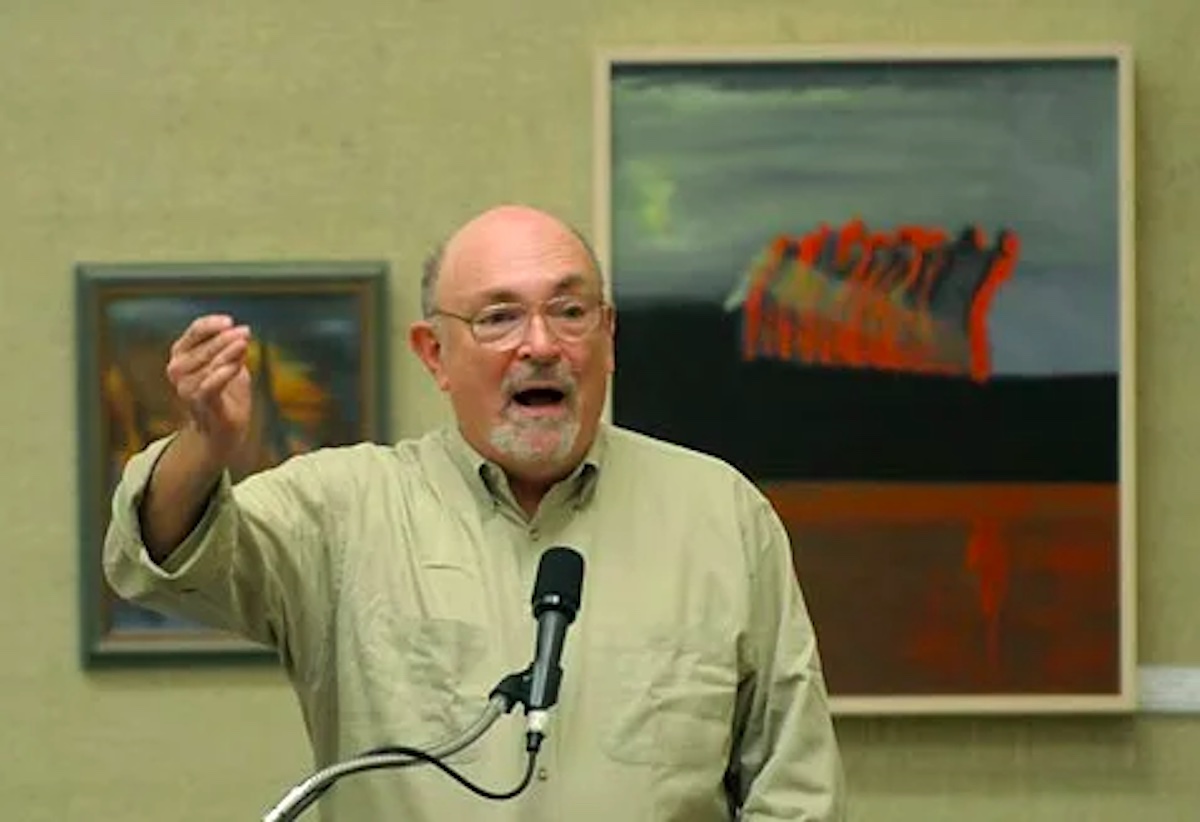
Dick Flacks is situated comfortably in his living room, the legendary ground zero of Santa Barbara’s progressive politics. Dressed in a loose, beach-bum T-shirt with broad horizontal stripes, blue jeans, and fleece-lined slippers, Flacks leans back into his couch. It’s a ridiculously beautiful Sunday afternoon, and Flacks is preparing for his retirement party, an exaltation of his career as activist and academic — a two-day event billed as Flacks Fest. But at the moment, Flacks seems a little miffed. Somehow, he was not included in the recently published book listing the 101 “most dangerous” college professors in the United States, written by David Horowitz, the one-time left-wing radical turned right-wing firebrand. “I was upset,” Flacks says, an ironic twinkle escaping the prism of his Coke-bottle glasses. “I wasn’t in there. I don’t know why not.”
Flacks is teasing. But he has a point.
When Flacks was appointed to a tenure-track professorship in UCSB’s sociology department in 1969, he’d already achieved notoriety at the University of Chicago as a radical anti-war activist. Ronald Reagan, then the governor of California, quipped that hiring Flacks was like hiring a pyromaniac to work in a firecracker factory. It was a nice line, and for Flacks, perhaps the ultimate backhanded compliment. But other reactions were less charming. Robert Lagomarsino, then Santa Barbara’s Republican state senator, went so far as to call for a House Un-American Activities Committee investigation. To keep any more of Flacks’s ilk from getting tenure, the University of California’s Board of Regents voted to take control of the appointment process. The Santa Barbara News-Press’s editorial pages quivered about the potential violence Flacks might unleash. And all that was before he even moved to town.
Flacks didn’t turn out to be the bomb-thrower his detractors predicted. As his UCSB friend and colleague, Harvey Molotch, once dryly noted, “Dick was never at all athletic.” Instead, Flacks spent the next 37 years on campus advocating a pragmatic brand of radical politics coupled with nonviolent civil disobedience. As a result, Flacks was allowed to operate with a relatively free hand, helping to radicalize generations of students. Both through his classes on social movements and his work with student groups, Flacks inspired young people to go into the world and “make history.”
As a “think global, act local” kind of guy, Flacks directed many of his students’ idealism toward the Santa Barbara community, where he secured them positions in many of the political and counter-cultural organizations he had helped to found. In most of Santa Barbara’s defining political debates — including growth, water, housing, homelessness, the living wage, immigrants’ rights, environment protection, and alternative transportation — activists
nurtured by Flacks have played crucial roles.
Harley Augustino of PUEBLO, the grassroots organization that helped bring 20,000 marchers to the streets of Santa Barbara in support of immigrants’ rights last week, started his career with the Isla Vista Tenants Union and then with the Living Wage Coalition thanks to a helping hand from Flacks. Geoff Green, the current director of the Fund for
Santa Barbara, which finances progressive groups countywide; political organizer Ed Maschke, who kept Goleta developers tied up in knots for more than 20 years; and Rob Rosenthal, whose work with Santa Barbara’s homeless helped them emerge as a political force in the 1980s, all were mentored by Dick Flacks.
Though most of his protégés have been men — known as the Flacks Boys — he has mentored a number of influential women including Roseanne DeMoro, the head of California Nurses Association, who last year chased Governor
Arnold Schwarzenegger up one side of California and down the other in aggressive, successful opposition to four ballot initiatives he was backing.
The work of these men and women prove something that Dick Flacks believes with all his might: Small groups of individuals can make history.
From Red Diapers to String Quartets
The older of two children, Flacks was born in Brooklyn, New York, in 1938. His parents David and Mildred Flacks — both school teachers — were born to Russian Jewish immigrants. Both were active union members and organizers; both belonged to the Communist Party. But when the Cold War began in the 1950s, the Soviet Union ceased being
America’s ally and became instead its mortal enemy. Flacks’s parents were targeted by anti-communist investigators and fired from their jobs.
Under Khrushchev’s leadership, information about the horrors of Stalin’s blood-thirsty regime became more generally known. Then, in 1956, the Soviets invaded Hungary. Flacks — a scholarly young teenager — began to find the blindly pro-U.S.S.R. position of the U.S. Communist Party, and his own father, repellent. At the same
time, the rest of the American left had become virulently anti-communist. Radical red-diaper babies like Dick Flacks were having a hard time finding a place to call home. Then, in 1957, Flacks met Mickey Hartman, the daughter of Yiddish-speaking, Russian-born immigrants. One year later, the two married, beginning a 48-year partnership that produced both a family and a political juggernaut.
Together, the two students stumbled onto an aging American revolutionary named A.J. Muste, whose political vision fused Christian social justice, American populism, and nonviolent civil disobedience. For them, it was as if the sky opened up. “Revolutionary nonviolence? No one was putting those two words in the same sentence back then, let alone giving it serious thought,” said Flacks. “Muste became a complete role model for me.” So much so, Flacks gave his second son the middle name “Ajay.” Stifled by the political claustrophobia of Brooklyn, the young couple set out for the University of Michigan, where Flacks attended graduate school. “We didn’t want to be part of New York,” Flacks said. “We wanted to be part of America in the much broader sense.”
In Michigan, Flacks sought out other young activists whose politics emerged more from Midwestern prairie populism than from Marx. One such activist was Tom Hayden, who would become Flacks’s lifelong friend and political partner. Inspired by the death-defying courage of Southern civil rights workers, who also followed a nonviolent approach to social change, the Flackses joined Hayden in reorganizing Students for a Democratic Society (SDS), then an obscure group loosely affiliated with the United Auto Workers Union. In 1962, Flacks, Hayden, and about 60 SDS
activists gathered in Port Huron, Michigan, to pen what would become the rhetorical anthem for the New Left. An almost hormonal celebration of the democratic impulse, the statement began, “We are people of this generation, bred in at least modest comfort, housed now in universities, looking uncomfortably at the world we inherit.” It blasted both major superpowers — the U.S.A. and the U.S.S.R. — and supported democratic principles that they believed could coexist within socialistic and communistic structures. Acknowledging the raw audacity of their vision, the authors wrote, “If we appear to seek the unattainable … let it be known we do so to avoid the unimaginable.”

While in Michigan, Dick and Mickey Flacks began developing a lifestyle that not only kept them sane, it kept them human. They discovered college football, attending all of Michigan’s home games. Mickey remembered once having to yank Dick from an interminable SDS meeting to get to the stadium on time. No one could believe where they were going. Football before global liberation? “They thought we’d lost our freaking minds,” Mickey said. “But we’ve always made it a priority to take time for ourselves. We like going to the movies, eating out in restaurants. We have balance in our lives. That’s our secret.”
As a fledgling academic, Flacks was very much the hot young thing. In 1964, he secured a tenure-track position with the University of Chicago, then among the world’s most prestigious institutes of higher learning, not its current incarnation as a hotbed of neo-con political thought. Flacks resigned from SDS when he took the appointment, but he didn’t stop his political activities. That did not sit well with the school’s administration. Nor did his support of the 121 students who were expelled for sitting-in against the Vietnam War.
At that time Flacks was researching what would become his first published work, Liberated Generation. In tracking the family history of young college activists, he determined their protests were not examples of adolescent rebellion — as noted scholars such as Bruno Bettelheim were insisting — but extensions of the values they learned at home. The book — and its notion that young people could operate as an independent force in American society — put Flacks on the map. Soon publications like Newsweek and the Chicago Tribune sought his opinions on the political activism of the exploding youth culture. At the University of Chicago, however, most faculty couples led social lives that were decidedly old world. Their dinner parties with string quartets and black servants were too bizarre for the
Flackses. As Mickey described it, “It was the last bastion of 19th-century male-dominated, super-intellectual elitist nonsense. It wasn’t our scene.”
But by then, UCSB’s sociology department — which was beginning to enjoy a distinctive, quirky reputation — had been courting Flacks. When the University of Chicago did not grant him early tenure, he started looking westward. The last straw came when Flacks was brutally attacked in his campus office by a man posing as a newspaper reporter. The attack — which police believe was administered with something like a crow bar — left his skull
cratered in two spots and his right hand nearly severed at the wrist. Flacks’s assailant was never found.
Flacks hoped a sunny campus by the Pacific would offer the quiet he needed. How wrong could one man be? He arrived with his family just months after the historic Santa Barbara oil spill and just months before the burning of the Bank of America in Isla Vista.
Sign up for Indy Today to receive fresh news from Independent.com, in your inbox, every morning.
Campus Guru Meets the Thursday Club
Flacks’s 1969 appointment stirred significant concern that his assailant might strike again. Even relatively conservative faculty members like Otis Graham volunteered to guard the Flackses’ new home. On the other hand, a new neighbor volunteered to spy on the family for the sheriff and the FBI. “But mostly, people were really, really
nice,” said Mickey. For Flacks himself, the times were exciting, bizarre, and nerve-wracking. “Between 1969 and 1979, there was not a single normal moment on campus where you could go about your routine,” he said. “Most of the classes were held in I.V., not in the classrooms; there were bomb threats constantly; fire alarms going off; huge dogs named Trotsky walking down the hallways; and every shade of hippie-dom you could imagine.”
Flacks was too old — and too straight-laced — for the hedonistic celebration of flesh and pharmaceuticals then accompanying the anti-war movement on college campuses. He managed to establish himself as a bona fide campus guru nonetheless. “The deal was if you took politics seriously and you took social change seriously
and you did not ask Dick to smoke dope with you, then he would take you seriously,” explained sociologist Harvey Molotch. “That was a deal many people were willing to make.” Those who did found that Flacks could be both seriously intimidating and a friendly adviser. They also found he was passionately curious about what students
think and ferociously dedicated to their right to express themselves.
Contrary to urban folklore, Flacks was not involved in the burning of the I.V. Bank of America. In fact, his friends made a point of shooing him away from any protest that looked potentially unruly because handcuffs could seriously damage his still injured wrist. For his part, Flacks does not consider the bank burning a positive political act; it happened, he said, in the spasm of the moment and in response to escalating police violence. “I don’t think anybody planned to burn the bank down,” he said.
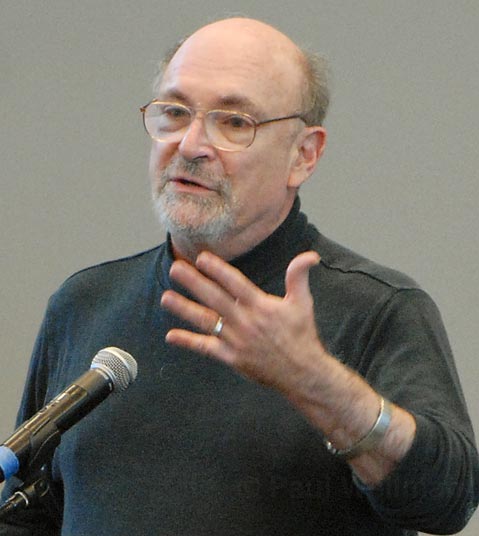
It was after the bank burning, however, that Flacks really made his mark on Santa Barbara. He and Mickey started something called the Thursday Club, an evolving collection of high-octane activists who met every Thursday at their home. “We knew we couldn’t continue with this violence,” Flacks said. “We had to build positive organizations and we had to have a voice.” The Flackses’ living room served as a Petri dish where ideas mixed with the seed-money of wealthy left-leaning patrons such as Stanley Sheinbaum, Kit Tremaine, Herman Warsh, Maryanne Mott, and Katy Peake. The Thursday Club produced an alternative community school, medical clinics, food co-ops, and a host of other community groups that gave expression to a new value system struggling to define itself. Though many of the original organizations have disappeared, they have been replaced by newer versions, with similar progressive values. The Santa Barbara Independent, for example, is a direct descendant of the News&Review, the worker cooperative weekly newspaper for which Flacks served as trustee and adviser. (One of The Independent’s four owners — Richard Parker — was an original founder of the News&Review.)
On the idea that all politics is local, Flacks turned his attention to elected offices. At the time, Flacks said, the Santa
Barbara City Council was dominated by “Republican board-of-realtor types and development interests.” Despite the hard work of earlier, more traditional reformers such as Pearl Chase, the city was in danger of becoming another overgrown Orange County. Dick and Mickey Flacks helped start the slow-growth Citizens Coalition, which succeeded in electing a more environmentally minded council majority. Flacks jokes how conservative those candidates would be judged by today’s standards. Of the four, one is now a Republican city councilmember in New Mexico, one was a nuclear engineer, one was a Westmont administrator, and one the wife of a prominent conservative Republican.
When development interests wrested back control in the late ’70s, Flacks and his wife joined with others to start Network and the Gray Panthers — in which Flacks’s parents, who had moved to town, were extremely active — to give the progressive community a consistent political voice at City Hall. After about 15 years these groups also faded out. But Dick and Mickey did not. In 2000 they got together with other concerned citizens — some of them ex-students — to form SBCAN. Its charge is to fuse the goals of the environmental and the social-justice movements — not an easy task when two visions of a perfect Santa Barbara are colliding: affordable housing versus small-town neighborhoods. How is it possible to have either in a market of million-dollar cottages? Simple problems don’t seem to interest the Flackses.
His Work, Their Lives, Our Town
Dick Flacks’s academic work reflects the same electrified lightning that has illuminated his own life. His research and writings all try to capture that flash, to document it, to analyze the source of its glow. Even as a student activist, Flacks was studying student activism. What made the activists tick? Did they stay active later in life, and if so in what ways? Why? How did activist students differ from students who weren’t active? Could you identify which
students were most likely to become active? All of this research — conducted over long intervals, through elaborate
surveys, and in detailed personal histories — focused on measuring the extent to which ordinary individuals can jumpstart historical change.
Flacks is now looking forward to a “retirement” that he acknowledges few people have been able to enjoy. He’ll still teach a couple of classes a year, keep his campus office, and program his weekly folk-music radio show, The Culture of Protest, which is the longest running program in KCSB history. And he and Mickey will travel. But of course there always will be politics.
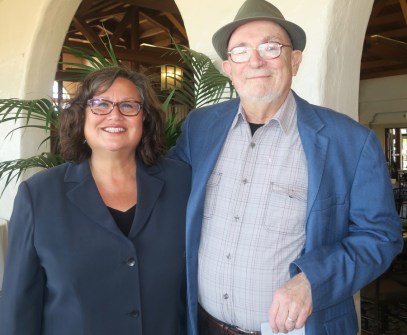
Flacks’s political beliefs have shifted a bit since first moving to Santa Barbara. He once believed that a ruling elite had usurped democratic control from a complacent population. Now he is not so sure. As Molotch explained it, in the present reality of Bush incompetence, “A ruling elite would be good news.” Where Flacks once regarded the university as a hatchery for intellectual worker-bees to maintain the corporate power structure, today, he’s
a passionate defender of the university. In times of budget crisis, Flacks fights to keep funding whole. He is also working to rewire the UC’s admissions system so that the children of immigrants, working parents, and minorities will be able to get a foot in the door and a seat in the classroom. At his core, Dick Flacks remains very much the same man he was when he first arrived in Santa Barbara. Then as now, he believed great social movements were
created by historical forces. Then as now, he believes that even the smallest group of individuals can make history.
Flacks does acknowledge that times have changed. For the better, he noted that democratic participation in daily life has expanded hugely in the past 35 years. But for the worse, he said, the powers-that-be have become increasingly resistant to change. With the rise of global economics, national governments are less able to
make economic concessions in the face of democratic demands. Still, people have to try. “If you took this town in 1969 and looked at what it was like then, you’d see that it’s changed enormously. There are Farmers Markets, environmental organizations, community health clinics — these are all mainstream. The assumed values in
our political debate have changed, too. I’m enough of an anarchist to think we can’t change the government at large. But can people do things to make small-scale changes that have meaning? We did. It’s a point of great pride to Mickey and me, that we have been involved with this,” he said. “In whatever time you are living, there will always be spaces for initiative.”
Flacks ought to know. He made the most of his. And that’s what makes him such a dangerous man.
Support the Santa Barbara Independent through a long-term or a single contribution.


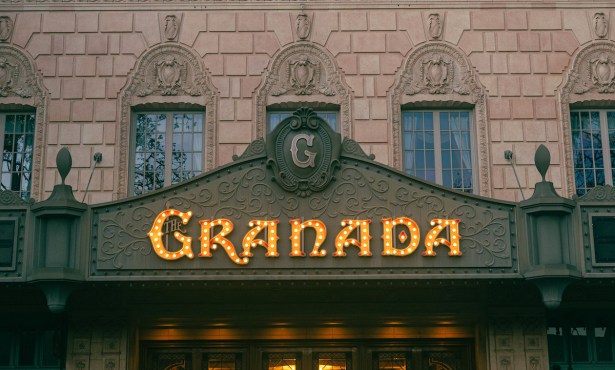
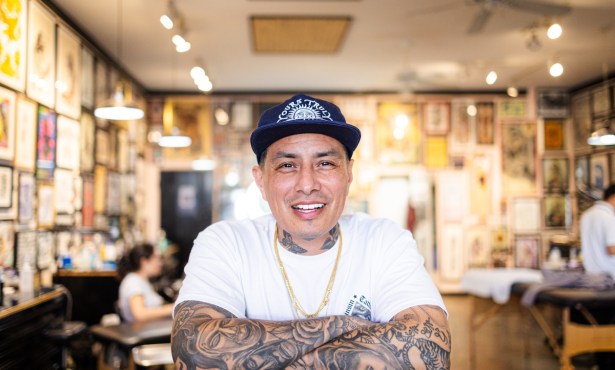
You must be logged in to post a comment.